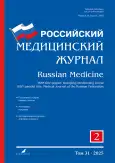Роль санитарно-просветительной работы врача в рамках диспансерного наблюдения пациентов с артериальной гипертензией
- Авторы: Абдрахманов А.Р.1, Полунин В.С.1, Тяжельников А.А.1
-
Учреждения:
- Российский национальный исследовательский медицинский университет имени Н.И. Пирогова
- Выпуск: Том 31, № 2 (2025)
- Страницы: 100-110
- Раздел: Оригинальные исследования
- URL: https://bakhtiniada.ru/0869-2106/article/view/313382
- DOI: https://doi.org/10.17816/medjrf677729
- ID: 313382
Цитировать
Аннотация
Обоснование. Артериальная гипертензия (АГ) — одна из ведущих медико-социальных проблем, требующих эффективных профилактических мероприятий. Санитарно-просветительная работа врача играет важную роль в повышении приверженности пациентов к немедикаментозным методам профилактики и лечения. Однако эффективность и полнота предоставляемых рекомендаций остаются недостаточно изученными.
Цель. Изучение санитарно-просветительной работы врачей с пациентами трудоспособного возраста, находящимися на диспансерном наблюдении в связи с АГ.
Методы. Проведён анализ анкетирования 350 пациентов с АГ в возрасте от 30 до 50 лет, находящихся на диспансерном наблюдении, и их медицинской документации с использованием статистических методик.
Результаты. Установлено, что 84% пациентов имели зафиксированные врачами в медицинской документации профилактические рекомендации, касающиеся снижения потребления соли, ведения дневника самоконтроля артериального давления, но не учитывающие индивидуальные особенности пациентов. Выявлена зависимость между полнотой рекомендаций и их выполнением пациентами: лица, получившие более полные и персонализированные рекомендации, демонстрировали более высокую приверженность к их выполнению.
Заключение. Необходимо совершенствовать санитарно-просветительную работу врачей с учётом индивидуальных особенностей пациентов с АГ, развивать телемедицинские консультации, обязательно направлять пациентов в школу здоровья при поликлинике, разрабатывать методические материалы и внедрять цифровые инструменты мониторинга. Полученные результаты могут быть использованы для совершенствования персонализированной санитарно-просветительной работы и оценки её эффективности в рамках диспансерного наблюдения пациентов с АГ.
Полный текст
Открыть статью на сайте журналаОб авторах
Айнур Раилевич Абдрахманов
Российский национальный исследовательский медицинский университет имени Н.И. Пирогова
Email: abdrakhmanovaynur@yandex.ru
ORCID iD: 0000-0003-3504-4196
SPIN-код: 1667-7272
Россия, Москва
Валерий Сократович Полунин
Российский национальный исследовательский медицинский университет имени Н.И. Пирогова
Автор, ответственный за переписку.
Email: lunapol@yandex.ru
ORCID iD: 0000-0002-2681-8527
SPIN-код: 3491-4908
д-р мед. наук, профессор
Россия, МоскваАндрей Александрович Тяжельников
Российский национальный исследовательский медицинский университет имени Н.И. Пирогова
Email: tyazhelnikovAA@zdrav.mos.ru
ORCID iD: 0000-0002-2191-0623
SPIN-код: 4251-4544
д-р мед. наук, доцент, профессор
Россия, МоскваСписок литературы
- Tregubov VN, Polukhin NV, Vodolagin MV. Analysis of works of N.A. Semashko on public health education. (To the 150th anniversary of the birth). Russian Journal of Preventive Medicine and Public Health. 2023;26(9):125–130. doi: 10.17116/profmed202326091125 EDN: IPOSGC
- Arterial hypertension in adults. Clinical guidelines 2020. Russian Journal of Cardiology. 2020;25(3):3786. (In Russ.) doi: 10.15829/1560-4071-2020-3-3786
- Balanova YuA, Drapkina OM, Kutsenko VA, et al. Hypertension in the Russian population during the COVID-19 pandemic: sex differences in prevalence, treatment and its effectiveness. Data from the ESSE-RF3 study. Cardiovascular Therapy and Prevention. 2023;22(8S):105–120. doi: 10.15829/1728-8800-2023-3785 EDN: YRUNUX
- Dickinson HO, Mason JM, Nicolson DJ, et al. Lifestyle interventions to reduce raised blood pressure: a systematic review of randomized controlled trials. Journal of Hypertension. 24(2):215–233. doi: 10.1097/01.hjh.0000199800.72563.26 EDN: WVBZTT
- Whelton PK, Carey RM, Aronow WS, et al. ACC/AHA.AAPA.ABC.ACPM.AGS.APhA.ASH.ASPC.NMA.PCNA Guideline for the prevention, detection, evaluation, and management of high blood pressure in adults: a report from the American College of Cardiology. American Heart Association Task Force on Clinical Practice Guidelines. J Am Coll Cardiol. 2018;71(19):2273–2275. doi: 10.1016/j.jacc.2017.11.005 EDN: YHSAPZ
- Polunina NV. Public health and healthcare. Moscow: Publishing house “Medical Information Agency”; 2010. 544 p. (In Russ.)
- Kalinina AM, Gomova TA, Kushunina DV, et al. Prophylactic activity of outpatients as an important factor of the efficiency of prophylactic medical examination and case follow-up: regional experience. Russian Journal of Preventive Medicine and Public Health. 2015;18(2-1):4–10. doi: 10.17116/profmed20151824-10 EDN: UGZGRZ
- Puzin SN, Shurgaya MA, Chandirli SA, et al. Aspects of medical and social rehabilitation of patients with essential hypertension. Medical and Social Expert Evaluation and Rehabilitation. 2014;1:10–15. EDN: SILHEV
- Eckert N, Mikhaylovski VV. "Health schools" as the key factor of efficient cardiovascular disease prevention. Sechenov Medical Journal. 2016;2(24):58–62. EDN: VXIFJI
- Skvortsov VV, Tagiev FZ, Volodina DM. School of health for patients with arterial hypertension. Meditsinskaya sestra (The Nurse). 2023;25(3):34–38. doi: 10.29296/25879979-2023-03-07 EDN: PTCWFU
- Korshun YuI, Vazap VA, Sidorenya AD, et al. Molodoj uchjonyj. 2018;14:124–125. (In Russ.) EDN: YVJXHE
- Agranovich NV, Knyshova SA, Anopchenko AS, et al. The need for the development and significance of the “School of the patient” in the complex therapy of hypertension. Modern Problems of Science and Education. 2018;(1):75. EDN: YPOFVU
- Lakhman EYu. School of health as a method of secondary prevention of mild and moderate arterial hypertension in outpatient settings [dissertation abstract]. Moscow; 2005. (In Russ.) EDN: NIAUNP
- Shemetova GN, Ryaboshapko AI, Gubanova GV. The role of schools for patients in the secondary prevention of arterial hypertension. Saratov Journal of Medical Scientific Research. 2017;13(3):481–483. EDN: YPTYHT
- Kudryavtseva SA. Methods of optimizing the treatment of patients with hypertension: medicinal and non-medicinal methods and their combinations. Vladimir: Transit-IKS, 2019.
Дополнительные файлы













